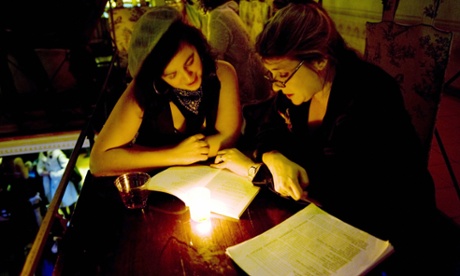A party where you pay to have verse read to you in a bordello-style setting is packing in the punters. Are poetry and sex work really comparable?

I am in the back room of the Backroom cocktail bar in New York, reclining on a fur-covered day bed. Next to me is a woman. She wears a leather corset and harem pants, like a gypsy girl from a fairytale. She is barefoot. In the dim candlelight, she asks what I’m in the mood for – something sexy? Something dark? I tell her what will please me, and she reads me a poem.
She calls herself a poetry whore, and I have paid for her company. For the next 10 minutes or so, she will read me her verses, converse with me, entertain me. Between sheer curtains I can see several other transactions unfolding around us, hear stanzas and lines being murmured in close quarters. Now and then, the madam passes unobtrusively through, keeping an eye on her rent boys and girls.
The madam is Stephanie Berger, who co-founded the Poetry Brothel with Nicholas Adamski in 2008. The two met while enrolled in the New School’s creative writing programme, bonding over a shared dissatisfaction with New York’s dry, highbrow poetry scene. They concocted the idea of a turn-of-the-century bordello – historically the realm of artists and miscreants – where writers could present their work in a more vibrant, visceral setting. They would dress up, invent alter egos, and sell not their bodies but their poems.
More
She calls herself a poetry whore, and I have paid for her company. For the next 10 minutes or so, she will read me her verses, converse with me, entertain me. Between sheer curtains I can see several other transactions unfolding around us, hear stanzas and lines being murmured in close quarters. Now and then, the madam passes unobtrusively through, keeping an eye on her rent boys and girls.
The madam is Stephanie Berger, who co-founded the Poetry Brothel with Nicholas Adamski in 2008. The two met while enrolled in the New School’s creative writing programme, bonding over a shared dissatisfaction with New York’s dry, highbrow poetry scene. They concocted the idea of a turn-of-the-century bordello – historically the realm of artists and miscreants – where writers could present their work in a more vibrant, visceral setting. They would dress up, invent alter egos, and sell not their bodies but their poems.
More
No comments:
Post a Comment